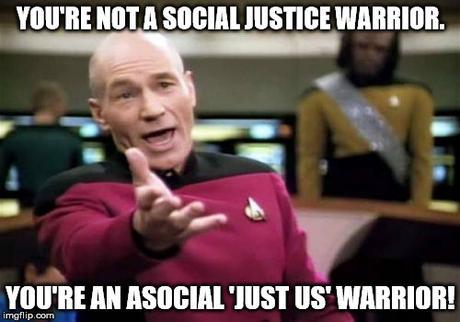Somehow that “system of whiteness” in the United States helped to elect the first African American president. But SJWs are never satisfied.

Via MyNorthwest.com: Two students who are helping form a new college aimed at social justice told KIRO Radio’s Dave Ross the “system of whiteness is the problem.”
Students at Western Washington University have banded together to form the college. Two of those students, who identified themselves as Aisha and Berger, said the issues at the forefront of their cause can be confusing for people unfamiliar with the academic territory. “White people are not the problem. The system of whiteness is the problem. There is a huge difference between those two things,” Berger explained.
“… We have been socialized to be very much steeped in white supremacy,” Berger said. “When we talk about whiteness, it’s not just about the color of your skin. We’re talking about all these norms that are created and pushed on us through institutions such as schooling, religious entities, and family units. That is how culture is reproduced, through these systems. Schooling being key sites.”
The Student Assembly for Power and Liberation has started an online petition calling for the formation of the College of Power and Liberation. The purpose of the college would be to “make Western Washington University a national leader in the development of academic programs that are committed to social justice.”
In its online petition, the student group lays out the structure of the college, which includes demanding the university hire 10 faculty members to work at the college, creating work study programs for 20 percent of students enrolled in the program, finding physical space for the college, and funding resource materials among other things.
The group also wants $50,000 to fund an opening symposium for the college. It also wants to form a 15 person, paid student committee called the Office for Social Transformation that will monitor, document and archive all racist, anti-black, transphobic, cissexist, misogynistic, ableist, homophobic, islamophobic, xenophobic, anti-semitic and otherwise oppressive behavior on campus. The petition states that examples of this behavior are often found in faculty curriculum and interactions with university administration, police or other students.
The students further demand that students who have been victims of harassment or acts of violence be compensated in the form of tuition reimbursement. This includes being affected through the university’s policies on the basis of gender, sexuality, ability, or race.
“Dealing with microaggression and any form of oppression is very detrimental to students, especially because we are trying to get an education,” Aisha said. “With this college, it will allow students to critically analyze and question systems of power that have historically and presently been racist or homophobic, transphobic or other forms of oppression. Through teaching American society these things, there will be a proliferation of people being aware of the harms of these types of behaviors,” she said.

WWU President Bruce Shepard
On March 1, Western Washington University Bruce Shepard referred the proposal to the student government at the university. He wrote that such a submission to his office is “backwards” from how things normally work at Western, noting that the school has a “bottom-up” approach to curriculum. “The proposal is problematic, initially coming, as it has, to my office. This is because Western works bottom up, not top down … No president can simply command such developments as those contained in the proposal.”
Shepard wrote that the proposal “brings out-of-the-box thoughtfulness to subjects of vital importance to Western and that so many across our campus are working on.” But he also states that faculty is usually relied upon for steering curriculum, as well as the university’s commissions and councils.
While the university president doesn’t ask for any action on the proposal, he does argue that it contradicts various aspects of the university’s operations. He stated, “The proposal would fundamentally contradict our policies, practices, mutually bargained contracts, and federal law and policy on such matters as faculty evaluation and discipline, student conduct and discipline, the investigation of alleged racist behaviors, and the planning of facilities, spaces, and residence halls. I further find, in the proposal, language possibly threatening our core commitments to campus-wide inclusivity and, again possibly, to academic freedom. The proposal is also problematic for it would have large budgetary impacts but is missing a critical component of any complete proposal; namely, a credible approach for funding.”
DCG

